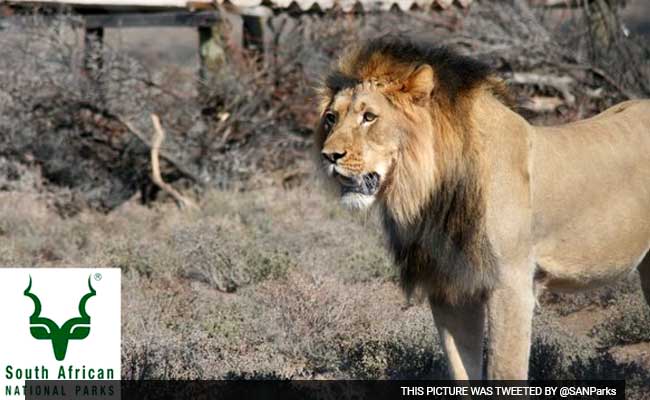
After the SANParks search team successfully darted and recaptured the lion high up in the mountains.
Johannesburg, South Africa:
A runaway South African lion who may be euthanized after repeatedly escaping from a national park has been re-captured, officials said on Thursday, adding that a decision would soon be made on his fate.
Sylvester the lion slipped out of the Karoo National Park in the south of the country at the weekend, triggering a major hunt for him by wildlife authorities.
He was caught after being shot with a tranquiliser dart fired from a helicopter, the South Africa National Parks authority (SANParks) announced, without saying when.
The escape was Sylvester's second in as many years. On his latest prowl he killed a cow on a private farm, local media reported.
 Last year, the big cat killed 28 sheep, a cow and a kudu antelope during three weeks on the run in which he roamed for hundreds of kilometres.
Last year, the big cat killed 28 sheep, a cow and a kudu antelope during three weeks on the run in which he roamed for hundreds of kilometres.
The three-year-old lion was eventually caught after that breakout and fitted with a tracking collar.
After his latest escape, SANParks announced it would put him down, but then back-tracked on the decision after objections from animal lovers.
"The lion was darted from the air in difficult terrain high up in the mountains and will need to be transported in a stretcher, on foot, for three kilometres (two miles) to the nearest awaiting vehicle," SANParks said in a statement.
"The lion will be kept in the park in a boma (enclosure) until a final decision is reached on its future."
Instead of being put down, Sylvester could be moved to another national park or private game reserve, or fencing could be improved to keep him inside the Karoo park.
Wildlife officials had warned he may pose a danger to humans.
Lions were re-introduced to Karoo National Park, in Western Cape province, in 2010 after an absence of almost 170 years.
Sylvester the lion slipped out of the Karoo National Park in the south of the country at the weekend, triggering a major hunt for him by wildlife authorities.
He was caught after being shot with a tranquiliser dart fired from a helicopter, the South Africa National Parks authority (SANParks) announced, without saying when.
The escape was Sylvester's second in as many years. On his latest prowl he killed a cow on a private farm, local media reported.

The escape was Sylvester's second in as many years.
The three-year-old lion was eventually caught after that breakout and fitted with a tracking collar.
After his latest escape, SANParks announced it would put him down, but then back-tracked on the decision after objections from animal lovers.
"The lion was darted from the air in difficult terrain high up in the mountains and will need to be transported in a stretcher, on foot, for three kilometres (two miles) to the nearest awaiting vehicle," SANParks said in a statement.
"The lion will be kept in the park in a boma (enclosure) until a final decision is reached on its future."
Instead of being put down, Sylvester could be moved to another national park or private game reserve, or fencing could be improved to keep him inside the Karoo park.
Wildlife officials had warned he may pose a danger to humans.
Lions were re-introduced to Karoo National Park, in Western Cape province, in 2010 after an absence of almost 170 years.
Track Latest News Live on NDTV.com and get news updates from India and around the world

